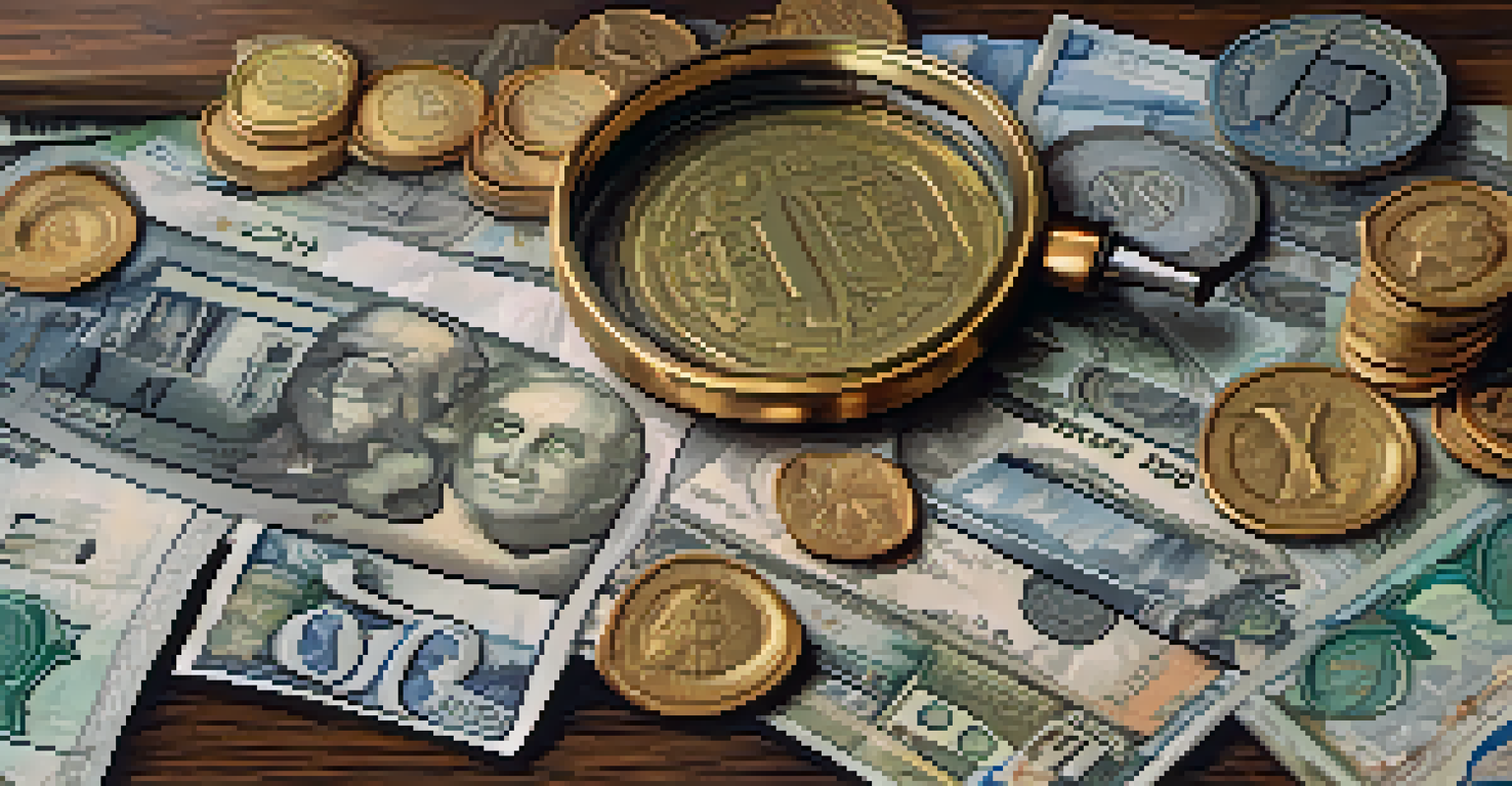Inflation and Currency: Understanding Exchange Rate Impacts

What Is Inflation and Why Does It Matter?
Inflation refers to the rate at which the general level of prices for goods and services rises, eroding purchasing power. It’s like that feeling when you realize your favorite coffee has gotten a bit pricier over time. Understanding inflation is crucial because it affects everything from your daily expenses to long-term savings and investments.
Inflation is the one form of taxation that can be imposed without legislation.
When inflation rises, each unit of currency buys fewer goods and services, which can lead to decreased consumer spending. This is important because consumer spending drives economic growth. If people feel like their money isn’t going as far, they may cut back on spending, which can slow down the economy.
Central banks, like the Federal Reserve in the U.S., often adjust interest rates to combat inflation. For instance, if inflation is high, they might raise interest rates to encourage saving rather than spending. This interplay between inflation and monetary policy is essential for maintaining economic stability.
Understanding Currency Value and Exchange Rates
Currency value is determined by various factors, including interest rates, economic stability, and trade balances. Think of it like a popularity contest; the more desirable a currency is, the more valuable it becomes on the global stage. Exchange rates, which indicate how much one currency is worth in relation to another, are influenced by these values.

For example, if the U.S. dollar strengthens against the euro, it means you can buy more euros with fewer dollars. This can happen due to a stronger U.S. economy or higher interest rates attracting foreign investment. Conversely, if the dollar weakens, everything from imports to vacations in Europe becomes more expensive.
Understanding Inflation's Impact
Inflation affects purchasing power and can slow down economic growth if consumer spending decreases.
Understanding these fluctuations is important for businesses and travelers alike. If you’re planning a trip abroad or engaging in international trade, knowing the exchange rate can help you budget effectively and avoid surprises.
How Inflation Affects Currency Value
Inflation plays a significant role in determining currency value. When a country experiences high inflation, its currency may lose value relative to other currencies. This is akin to a balloon losing air; once it starts deflating, it doesn’t take long for it to shrink significantly.
The value of a currency is determined by the strength of the economy behind it.
For instance, if the inflation rate in a country is higher than that of its trading partners, its currency might depreciate. This depreciation can lead to more expensive imports, further fueling inflation in a vicious cycle. Essentially, a weaker currency can make goods and services more costly for consumers.
As a result, countries with stable inflation rates typically see their currencies retain or increase their value over time. A stable economic environment encourages confidence among investors, which is vital for maintaining a strong currency.
The Role of Central Banks in Managing Inflation
Central banks are pivotal in controlling inflation and ensuring currency stability. They set monetary policy, which can include adjusting interest rates or controlling money supply. Think of them as the stewards of the economy, working to keep inflation in check and maintain confidence in the currency.
When inflation is rising, central banks may increase interest rates to cool down the economy. Higher interest rates can lead to reduced spending and borrowing, helping to stabilize prices. This approach is often referred to as contractionary monetary policy, which aims to curb inflation by slowing economic growth.
Currency Value and Exchange Rates
The value of a currency is influenced by factors like interest rates and economic stability, impacting international trade and travel.
On the flip side, if the economy is sluggish and inflation is low, central banks might lower interest rates to stimulate spending and investment. This balance is crucial for economic health, as too much inflation or deflation can wreak havoc on a country’s financial stability.
Global Events That Influence Inflation and Currency
Global events can have profound effects on inflation and currency values. For example, geopolitical tensions, natural disasters, or pandemics can disrupt supply chains and impact economic activity. These disruptions can lead to increased prices and, consequently, inflation.
Additionally, events like trade agreements or tariffs can affect currency exchange rates. If a country imposes tariffs on imports, it may lead to higher prices domestically, impacting inflation. Conversely, a trade agreement that boosts exports could strengthen the currency as demand increases.
Understanding these global influences helps individuals and businesses make informed decisions. For instance, travelers may want to consider current events that could affect exchange rates when planning trips abroad.
The Impact of Exchange Rates on Consumers
Exchange rates directly affect consumers, especially when traveling or purchasing imported goods. A favorable exchange rate means that your money goes further, allowing you to enjoy more during your travels. On the other hand, a weak currency can make vacations and international purchases more expensive.
For example, if you’re traveling to a country where your currency has weakened, you may notice that meals, souvenirs, and even hotel stays cost more than expected. This can significantly impact your travel budget, making it essential to keep an eye on exchange rates before booking trips.
Central Banks and Economic Stability
Central banks play a crucial role in managing inflation and currency value through monetary policy adjustments.
Moreover, consumers also feel the pinch when exchange rates fluctuate for imported goods. If the U.S. dollar weakens against other currencies, imported products can become pricier. This can lead to higher prices at the grocery store or for electronics, affecting household budgets.
Strategies for Navigating Inflation and Currency Fluctuations
Navigating inflation and currency fluctuations requires awareness and strategic planning. One effective strategy is to diversify investments. By spreading investments across various asset classes, you can mitigate risks associated with inflation and currency volatility.
Additionally, keeping an eye on economic indicators can provide insights into potential inflation trends. For instance, monitoring interest rates, employment rates, and consumer spending can help you anticipate changes in the economy. This knowledge can empower you to make informed financial decisions.

Lastly, consider using financial tools or consulting with a financial advisor to help manage your finances during times of inflation. Having a plan in place can help you stay resilient and navigate the complexities of an ever-changing economic landscape.